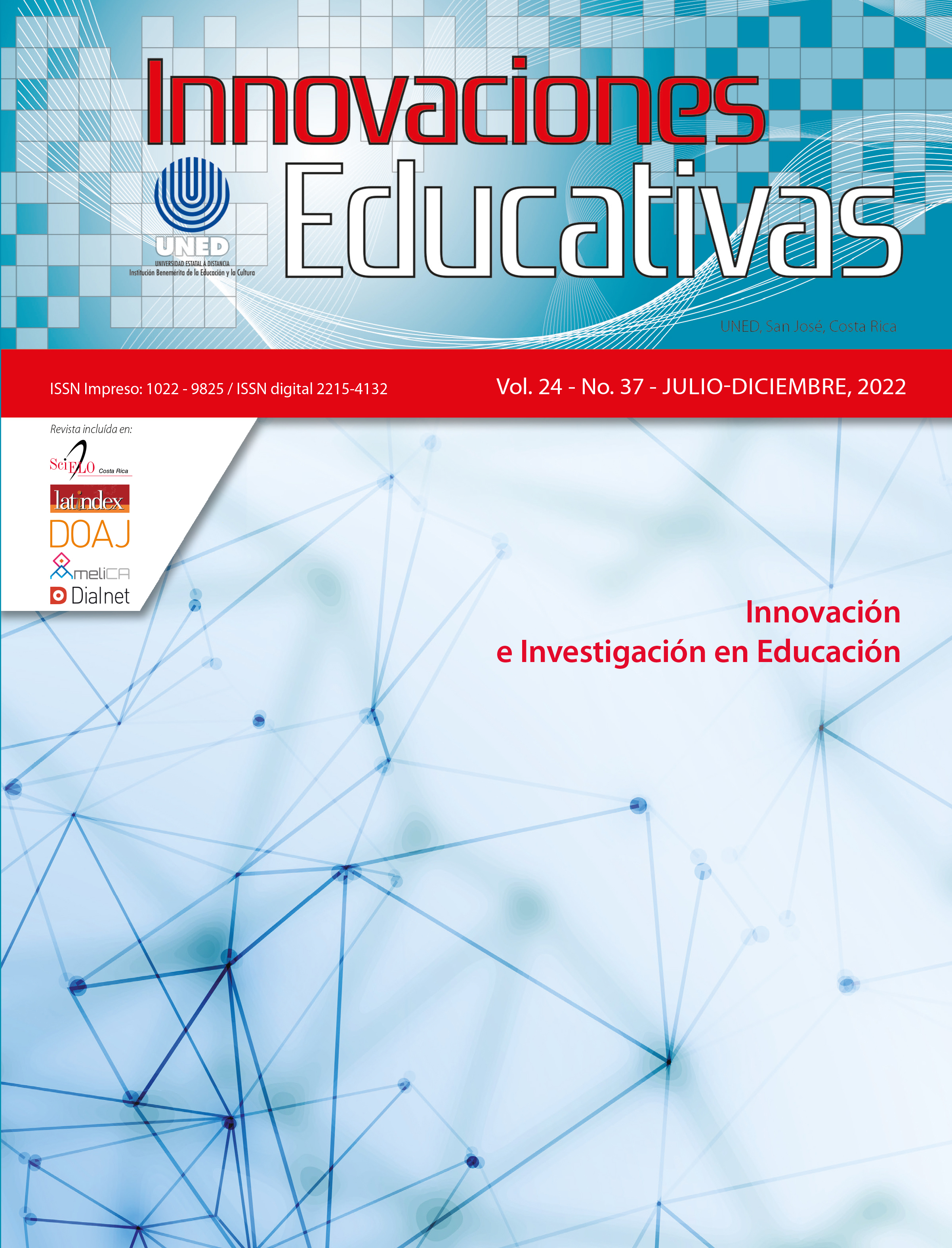Promoting the capacity for self-control in children: concepts and strategies in context
DOI:
https://doi.org/10.22458/ie.v24i37.4068Keywords:
self-control, self-discipline, candy test, socialization, life competencies, decision making, confidence, social and emotional learningAbstract
This essay aims to show and discuss key aspects of child self-control based on recent research, as well as to propose factors and strategies to promote the development of this important capacity. To do this, he begins by defining self-control, then identifies some of its benefits, then describes the marshmallow test, as well as its analysis in context. Then it relates self-control with decision-making, analyzes the role of trust, the role of adults in its promotion in girls and boys, and finally proposes some strategies to support it.
References
Arrieta, A. y Chaverri, P. (2019). Componentes del autocontrol. Revista Electrónica de Psicología de Iztacala, 22(2), 1005-1023.Recuperado de http://www.revistas.unam.mx/index.php/repi/article/view/70147
Baumeister, R. F., Vohs K. D. & Tice, D. M. (2007). The Strength Model of Self‐control. Current Directions in Psychological Science, 16(6), 351‐355.10.1111 / j.1467-8721.2007. 00534.x
Bronfenbrenner, U. (2005). Making human beings human: Bioecological perspectives on human development. Sage.
Chaverri, P., Conejo, D., León, S., & Arrieta, A. (2020). Postergación de la Gratificación en Preescolares Costarricenses: Efecto de la Confianza en la Persona Experimentadora y del Estrato Socioeconómico [Informe de investigación]. Instituto de Estudios Interdisciplinarios de la Niñez y la Adolescencia (INEINA), Universidad Nacional (UNA).
Chaverri, P., Barrantes, R., & Conejo, D. (2021). El test de la golosina en contexto: ¿cómo influye el entorno social en la toma de decisiones y el autocontrol? Ciencias Psicológicas, 15(2), e–2486. https://doi.org/10.22235/cp.v15i2.2486
Durlak, J. A., Weissberg, R. P., Dymnicki, A. B., Taylor, R. D., & Schellinger, K. B. (2011). The Impact of Enhancing Students’ Social and Emotional Learning: A Meta-Analysis of School-Based Universal Interventions: Social and Emotional Learning. Child Development, 82(1), 405-432. https://doi.org/10.1111/j.1467-8624.2010.01564.x
Gertler, P., Heckman, J., Pinto, R., Zanolini, A., Vermeersch, C., Walker, S., Chang, S. M., & Grantham-McGregor, S. (2014). Labor market returns to an early childhood stimulation intervention in Jamaica. Science, 344(6187), 998-1001. https://doi.org/10.1126/science.1251178
Kidd, C., Palmeri, H., & Aslin, R. N. (2013). Rational snacking: Young children’s decision-making on the marshmallow task is moderated by beliefs about environmental reliability. Cognition, 126(1), 109-114. https://doi.org/10.1016/j.cognition.2012.08.004
King, K. M., Fleming, C. B., Monahan, K. C. & Catalano, R. F. (2011). Changes in self‐controlproblems and attention problems during middle school predict alcohol, tobacco, and marijuana use during high school. Psychology of Addictive Behaviors, 25(1), 69‐79. doi: 10.1037 / a0021958.
Lerner, J., Li, Y., Valdesolo, P. & Kassam, K. (2015). Emotion and Decision Making. Annu. Rev. Psychol, 66, 799-823. https://doi.org/10.1146/annurev-psych-010213-115043
Lamm, B., Keller, H., Teiser, J., Gudi, H., Yovsi, R. D., Freitag, C., Poloczek, S., Fassbender, I., Suhrke, J., Teubert, M., Vöhringer, I., Knopf, M., Schwarzer, G., & Lohaus, A. (2018). Waiting for the Second Treat: Developing Culture-Specific Modes of Self-Regulation. Child Development, 89(3), e261-e277. https://doi.org/10.1111/cdev.12847
March, J. G. (2010). A primer on decision making: How decisions happen. Free Press.
Mischel, W. & Gilligan, C. (1964). Delay of gratification, motivation for the prohibited gratification, and responses to temptation. The Journal of Abnormal and Social Psychology, Vol 69(4), Oct 1964, 411-417, https://doi.org/10.1037/h0048918
Mischel, W., Shoda, Y., & Rodriguez, M. L. (1989). Delay of gratification in children. Science, 244, 933–938.
Mischel, W. (2015). El test de la golosina. Debate Editorial.
Moffitt, T., Arseneault, L., Belsky, D., Dickson, N., Hancox, R., Harrington, H., & Caspi, A. (2011). A gradient of childhood self‐control predicts health, wealth, and public safety. ProceedingsoftheNationalAcademyofSciences, 108 (7), 2693–2698.10.1073 /pnas.1010076108
Monjaras, C. (2013). Programa para promover el autocontrol en alumnos de segundo grado de primaria [Tesis de Licenciatura, Universidad Pedagógica Nacional]. Recuperado dehttp://200.23.113.51/pdf/29928.pdf
Nelsen, J. (2006). Disciplina Positiva. Editorial Ruiz.
Pinker, S. (2009). How the mind works. Norton.
Robbins, P., & Aydede, M. (Eds.). (2009). The Cambridge handbook of situated cognition. Cambridge University Press.
Sanfey, A. G. (2003). The Neural Basis of Economic Decision-Making in the Ultimatum Game. Science, 300(5626), 1755-1758. https://doi.org/10.1126/science.1082976
Sapolsky, R. M. (2018). Behave: The biology of humans at our best and worst. Penguin.
Soon, C. S., Brass, M., Heinze, H.-J., & Haynes, J.-D. (2008). Unconscious determinants of free decisions in the human brain. Nature Neuroscience, 11(5), 543-545. https://doi.org/10.1038/nn.2112
Tangney, J., Baumeister, R. & Boone, A. L. (2004). High self‐control predicts good adjustment, less pathology, better grades, and interpersonal success. Journal of Personality, 72(2), 271‐ 324. 10.1111 / j.0022-3506.2004.00263.x
Thagard, P. (2019). Mind-society: From brains to social sciences and professions. Oxford University Press.
Thaler, R. H., & Sunstein, C. R. (2009). Nudge: Improving decisions about health, wealth, and happiness. Penguin Books.
Todd, P. M., & Gigerenzer, G. (Eds.). (2012). Ecological rationality: Intelligence in the world. Oxford University Press.
Tomasello, M. (2019). Becoming human: A theory of ontogeny. The Belknap Press of HarvardUniversity Press.
UNICEF (2020). Niños y niñas en América Latina y el Caribe: Panorama 2020. UNICEF.
Uzonwanne, F. (2016) Rational Model of Decision Making. Global Encyclopedia of Public Administration, Public Policy, and Governance. Springer International Publishing. DOI: 10.1007/978-3-319-31816-5



